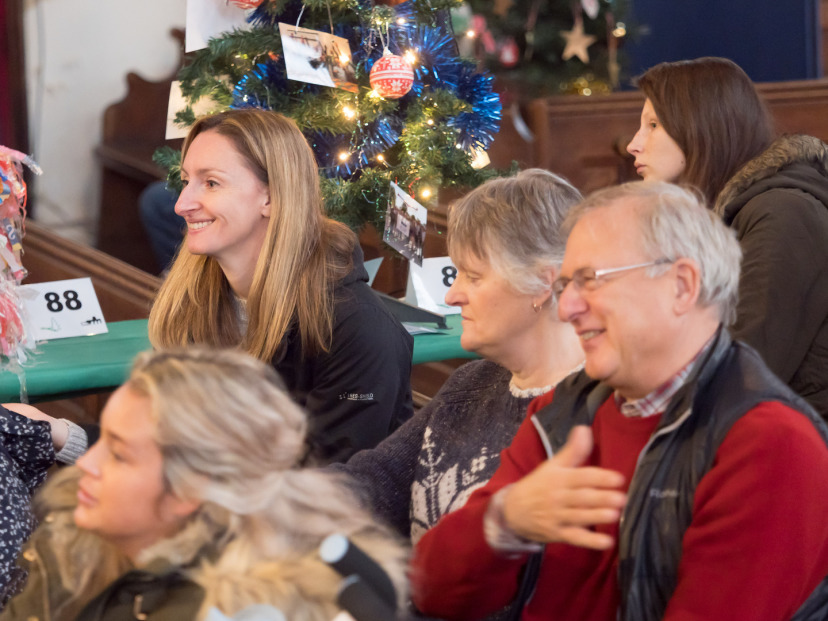Multitude of Voyces' Makaton Mass
This project is currently in development, and will provide churches, schools, care-homes and other community groups with an expertly researched and prepared Inclusive, all-age Eucharist service, to be sung to especially-composed music, and signed using the Makaton sign-language. Multitude of Voyces is building a highly-skilled and experienced team including staff and residents from the charity Alabare, adults and children with and without Intellectual Disabilities, music therapists, clergy with relevant experience in SEND education and support, Soundabout Inclusive Choir, and liturgists.
This project will be complex and costly and will necessarily take time to build so that it is really beneficial for those we wish to support.
If you or your organisation would like to support our work please email louisestewart@multitudeofvoyces.co.uk to discuss the various ways in which help could be provided. This might be through making a financial donation to help us pay the composers or to pay for the new signs to be created; offering free use of a church hall or community room (in the Salisbury area) for development workshops and meetings; offering support and advice on risk assessments and Covid-secure practice for intergenerational learning; discussing the project with your school, care-home or other supported-living environment; offering your time to try out the new music and words with your family and providing feedback etc.
We hope to complete this project by the end of 2023. See below for the rationale behind our project based on our two pilot projects in 2017 and 2018.
Makaton Mass!
Children and adults with learning disabilities need resources designed especially for them, to enable them to join in as equals. In our pilot project children worked in pairs; each child had a ‘buddy’ to help them learn their signs: some chose much younger buddies!
Families will be able to enjoy learning the same resources so that all generations can join in together. Families may feel more welcome in churches which understand their particular needs.
Siblings of children and adults with additional needs will be able to worship together and support each other.
Clergy might use skills and training from former vocations and professions to work together with teachers and other specialists to teach whole communities the music and the Makaton signs. Traditional worship in historic buildings can accommodate Makaton Mass, too! More-flexible buildings can allow worship to be celebrated in a circle so that everyone can see and support each other.
Makaton Mass combines visual, auditory and kinaesthetic skills; these are the bedrock of good teaching and learning: they aid retention and recall.
Gesture is at the heart of the Eucharist:
Makaton Mass builds on gestures within the Eucharist such as processing/kissing the Gospel/breaking the bread/raising the Host/raising the chalice/sharingthe Peace/hands held together or raised in prayer.
Especially prepared supplementary resources will ensure that everyone is included: visual aids, video, Powerpoint slides, printed resources, organ/piano/ instrumental parts will all be available: no-one need be left out. Everyone will be able to join in as they are able, and as they wish.
Makaton is a real language, understood and used internationally. Families with English as a second or third language will be included as equals: the whole Mass will be translated into Makaton signs and the use of music will help worshippers to learn English texts.
Churches can use Makaton Mass to support visually-impaired worshippers.
Chaplains to the deaf tell us that Makaton Mass will be a valuable resource for the deaf and hearing-impaired communities, too. The signs will be familiar to BSL signers, who will be able to support those used to singing, but not used to signing. Deaf and hearing communities will be able to worship together; singing and signing the same word at the same time.
Worshippers will be able to sign, or sing, or watch, or listen, or
sign and sing or just move to the rhythms and the melodies! Composers will work collaboratively with other experts, including Makaton users, to compose music which can be readily learned on little rehearsal.
The music will be easier to learn than many traditional sung services but will be underpinned by the creators' classical-training and professional expertise as teachers and composers. Advice from music therapists and other specialist professionals will support Multitude of Voyces in ensuring that the music is appropriate and variable to the needs of all participants.
Musicians from all walks of life will be able to join in with Makaton Mass using the music and signs to bring diverse musical styles and instruments together.
Small congregations without choirs and instruments will be able to use Makaton Mass, too, using our video and audio resources for support.
We see the Makaton Mass becoming an important and useful resource for churches of all sizes and styles where the public participates in the celebration of the Eucharist. Churches and cathedrals could make regular use of the Makaton Mass and could build their sustainable inclusive support around those services, identifying better the needs of families and individuals who might presently feel excluded and using the Makaton Mass as the ‘bedrock’ on which to build further integrated support. Makaton Mass could be used in whole, or in part.
(c) Multitude of Voyces (2018)


